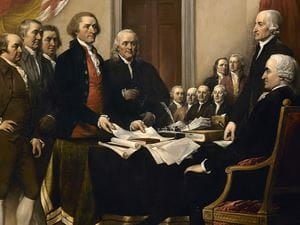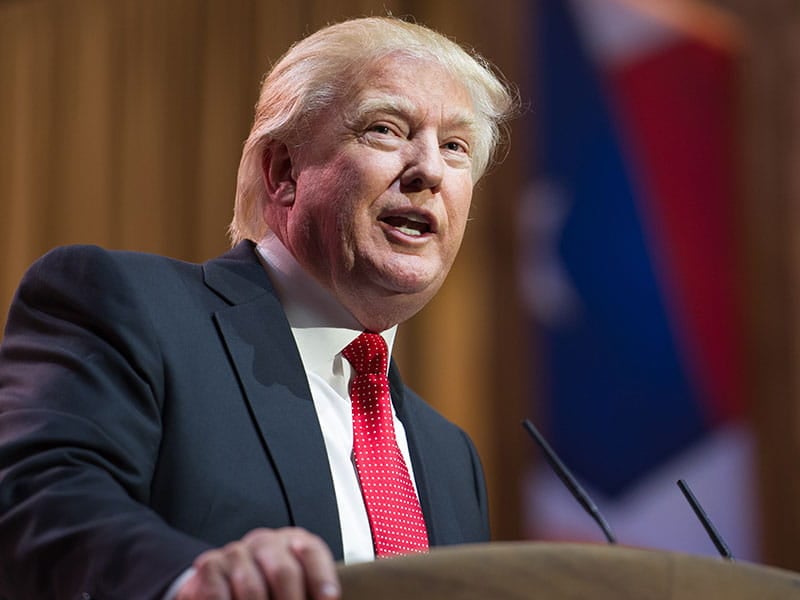
Public Domain
The religious views of the Founding Fathers have always been a source of interest. People with political interests have occasionally used the Founding Fathers’ beliefs to argue for or against a position, while historians have tried to reconstruct the beliefs of some of the most important men in history. Unfortunately, many of the Founding Fathers were rather private individuals when it came to their religious beliefs and did not leave a clear record of what tenets they held to in life. That does not mean, however, that scholars have been unable to piece together a rough estimate of what some of the Founding Fathers believed.
George Washington
George Washington’s religious beliefs are unclear to those living today. Many sources paint him as a believing Christian, but others support the theory that Washington was a Deist. Washington was born to an Anglican family and baptized as such. He was a devoted member of his church and became a vestryman in Truro Parish. Washington later served as churchwarden for three terms and helped care for the poor.Washington was generally private about his religious beliefs, and his personal writings reflect that stance. He referred to God, Providence and a Creator many times in his writings, but it is unclear if he was speaking of God as Christians know Him or as the Deist Creator. George Washington’s nephew witnessed him kneeling to do personal devotions with an open Bible in the morning and evening, but Washington was also said to leave church early in order to skip Holy Communion.
Given the lack of proof, the specifics of Washington’s religious beliefs remain something of a mystery. It is clear that he believed in a Creator God that was active in the universe, which precludes traditional Deism, and felt that the Creator was wise, inscrutable and irresistible. Given that Washington never mentioned the name Jesus Christ in his private writings, however, it is uncertain if he could be called a Christian. Referring to Christ by name, however, was not common among Anglicans or Episcopalians of Washington’s time.
Thomas Jefferson
Thomas Jefferson’s religious beliefs were a conglomeration of Deism and Christianity. Jefferson believed in the existence of a Supreme Creator who had both created and sustained the universe. This being was not, however, the God of Christianity in Jefferson’s eyes. Jefferson rejected the idea of Christ’s divinity and risked serious scandal when he created the Jefferson Bible. To do this, Jefferson took a blade to a Bible and removed any mention of the supernatural, including miracles and angels. What was left, Jefferson felt, was a document that contained the historical records and moral teachings of Jesus Christ. While Jefferson did not believe Christ was divine, he did say that Jesus’ teachings were the “outlines of a system of the most sublime morality which has ever fallen from the lips of man.” Jefferson saw Jesus not as the Son of God but as a great moral teacher nonetheless. Given the time period, it is perhaps unsurprising that Jefferson would later be accused of atheism.Benjamin Franklin
Benjamin Franklin was kind enough to leave a written record of his religious beliefs. Given his reputation for enjoying storytelling and his clever wit, it is perhaps unsurprising that he was willing to commit his thoughts to paper when asked by Ezra Stiles, then the president of Yale College. Franklin made the official record of his religious beliefs a mere six weeks before his death. Franklin’s statement of faith was simply stated and to the point, despite having hidden barbs of wit. It was, in short, exactly like the man himself.In the statement Franklin wrote to Stiles, Franklin said, “"Here is my Creed, I believe in one God, Creator of the Universe. That He governs it by His Providence. That he ought to be worshipped. That the most acceptable Service we render to him, is doing Good to his other Children. That the Soul of Man is immortal, and will be treated with Justice in another Life respecting its Conduct in this ... As for Jesus of Nazareth ... I think the system of Morals and Religion as he left them to us, the best the World ever saw ... but I have ... some Doubts to his Divinity; though' it is a Question I do not dogmatism upon, having never studied it, and think it is needless to busy myself with it now, where I expect soon an Opportunity of knowing the Truth with less Trouble."
John Adams
John Adams was another Founding Father who held to religious beliefs that were a conglomeration of several doctrines. Adams held that Christianity and the Bible originally came from divine revelation but had been later misinterpreted and misused. He blamed the institutions of Christianity for suffering and fraud, but maintained that the religion itself was “above all the religions that ever prevailed or existed in ancient or modern times, the religion of wisdom, virtue, equity and humanity.” Unlike Deists, Adams believed in miracles and God’s providence and accepted both Jesus as the redeemer of humanity and the biblical accounts of His miracles as truth. Adams did abandon, however, a number of traditionally Christian beliefs such as predestination and eternal damnation.James Madison
Despite being one of the greatest proponents of religious freedom, there is little evidence that describes James Madison’s personal beliefs. He was educated by Presbyterian clergymen but also read numerous Deist texts. Some scholars maintain that Madison was a Deist, but others claim he was a Christian man. There is little proof one way or another, but it is quite possible that Madison held to beliefs that were a sort of middle ground between Deism and Christianity like many of the other Founding Fathers.Though their religious views would be of great interest later, many of the Founding Fathers did not leave behind clear indicators of what precisely their religious beliefs were during their lives. The exception, of course, is Benjamin Franklin. Perhaps it is unsurprising that a man known for his clever wit would decide to give the world one more clever comment since he knew God would eventually get the last word.

